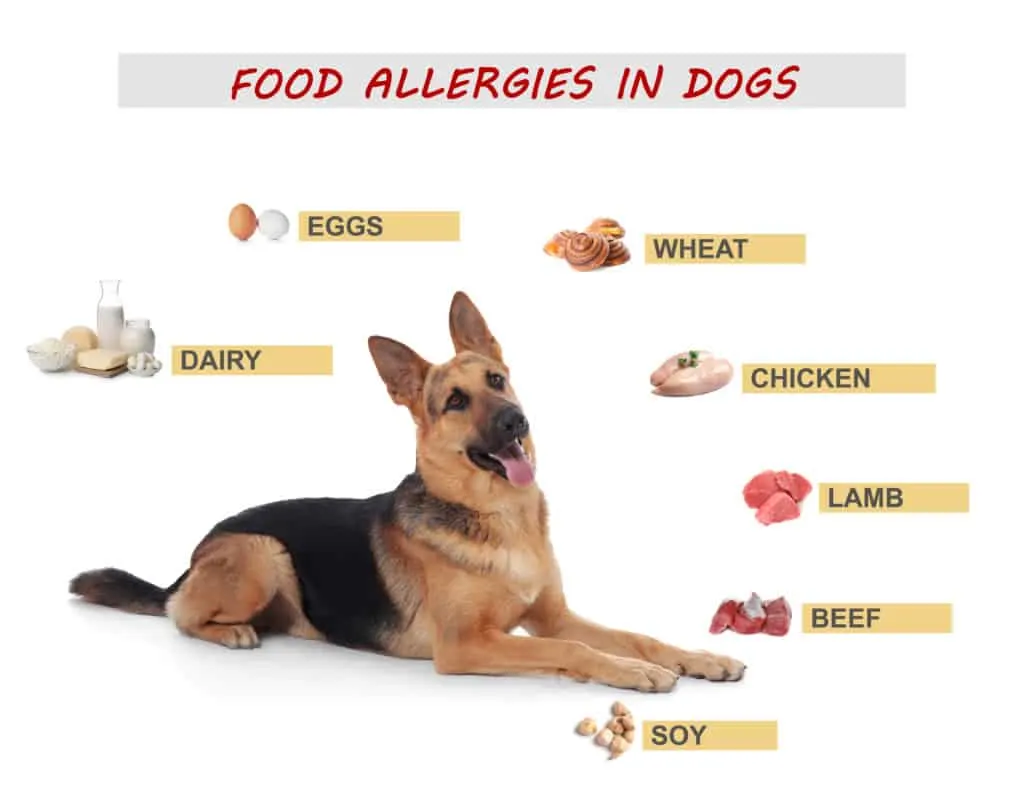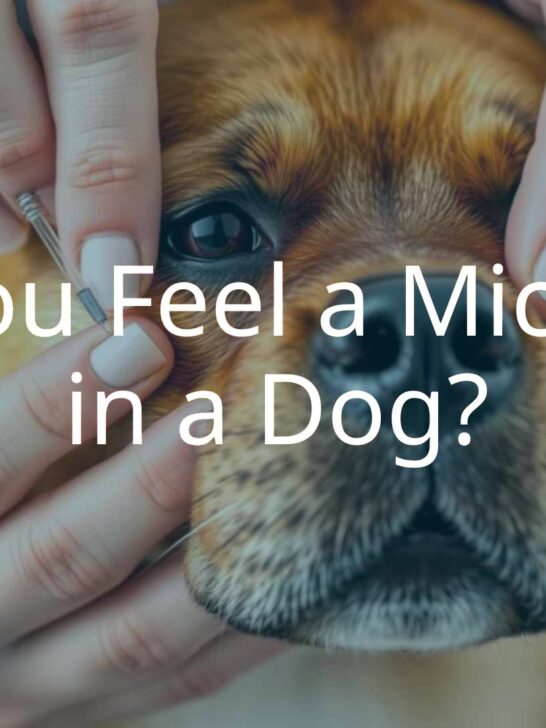German Shepherd Allergies: What Is Your GSD Allergic To?
It often surprises first-time German Shepherd owners to learn that their pups can get allergies too.
Dogs may love to explore the great outdoors, roll around in stinky stuff, jump in ponds and test everything by putting it in their mouths.
But sometimes this can have uncomfortable health consequences.
Some dog breeds are actually more prone to allergies than are others. In this article, find out what types of German Shepherd allergies you should be watching out for in your pup.
German Shepherd Allergies
As Aubrey Animal Medical Center (AAMC) points out, German Shepherds as a breed can be particularly prone to certain types of allergies.
Dog allergies are also known as a condition called “atopy.” Skin issues are one of the most common symptoms of allergies in dogs.
The rest of this article will talk about canine atopy. We’ll discuss what it looks like, warning signs and symptoms, and effective treatments.
What Causes German Shepherd Allergies?
As Vet Derm Clinic explains, German Shepherds as a breed can be especially prone to certain types of allergies.
Canine atopic dermatitis
Canine atopic dermatitis could just as easily be called an ‘environmental allergy’.
Like people, pups can be sensitive to pollen, mold, mildew, dust mites, bacteria, and fungi.
German Shepherds do have a thick double-layer coat. The coat still won’t be able to protect them if they lick, eat, roll in, or rub up against any of the environmental toxins that can trigger allergies.
The most common symptoms of canine atopic dermatitis are skin-related, but there can be additional symptoms to watch for as well:
- Skin or eye redness.
- Itchiness to skin, eyes, body, or paw pads.
- Skin rashes or irritation.
- Ear infection.
- “Fritos” smell coming from feet, hindquarters, ears.
- Hair loss.
- Abrasions, scabs, oozing pus.
Contact hypersensitivity
Contact hypersensitivity is quite similar to canine atopic dermatitis. However, this category typically focuses on human-made toxins in the environment that your dog may encounter.
Examples include:
- pesticides
- household cleaners
- insecticides
- fertilizer or mulch
- skincare products
- houseplants
- yard landscaping plants
- fibers from carpeting or household furnishings
- similar toxins
These are the major symptoms. You’ll notice many of the symptoms affect the German Shepherd’s skin, and especially the areas where there is naturally less hair:
- Itching or redness to the underbelly, underarms, anal area, paws, tail.
- Secondary skin issues such as infection.
- Skin rashes that spread over time.
As the German Shepherd Rescue of Orange County explains, hotspots are another common symptom of contact hypersensitivity.
Flea hypersensitivity
Flea bites are always going to be irritating to your dog. But some German Shepherds have a more serious reaction to flea bites that is called ‘flea bite hypersensitivity’ or ‘flea allergy’.
Flea bite allergy can cause the skin to itch intensely. As the dog scratches at the affected area, this can cause abrasion that leads to infection.
Eosinophilic furunculosis
As Veterinary Practice explains, German Shepherds can develop a more severe allergy to biting insects called eosinophilic furunculosis.
Eosinophilic furunculosis can cause the skin to develop irritation, infection, lesions, papules, nodules, crusts, oozing pus, and bleeding.
Often symptoms will appear on the face, inside the nasal cavities, on the ears, and in other areas where less hair is present.
Food allergies
If you are a first-time German Shepherd owner, you may be surprised to learn that your dog can develop food allergies just like people can.
As WebMD points out, up to 10 percent of all canine allergy cases will be traced back to food allergies.
German Shepherds tend to be more allergy-prone overall and sometimes this extends to food allergies. Symptoms of food allergies in dogs can be harder to isolate and identify at first.
This is because many of the symptoms of food allergies can initially look like symptoms of other health conditions.
As the American Kennel Club (AKC) urges, if you see your German Shepherd exhibiting any of these symptoms, you may want to talk with your veterinarian about testing for food allergies:
- Vomiting.
- Diarrhea.
- Repeat ear infections or paw pad infections.
- Itching in the anal area.
- Gastrointestinal discomfort, gas, bloating.
- Hives.
- Sneezing.
- Itchy, red, or watering eyes.
- Licking the paw pads or skin repeatedly.
- Swelling of facial extremities and ears.
Acute Allergies Versus Chronic Allergies in Dogs
Since your German Shepherd can suffer from a variety of different types of allergies and allergic reactions, it is important to learn how to tell an acute allergy attack apart from chronic allergies.
Acute allergies in German Shepherds
An acute or sudden allergy attack may come on if your dog eats something toxic or comes into contact with an extremely irritating toxin.
Typically these types of allergic attacks do not recur and often they will require emergency veterinary care.
One of the best examples is bee stings. Dogs can go into anaphylactic shock just like people.
Dogs can also develop swelling, hives, shortness of breath, among other warning signs that may require emergency medical attention.
Chronic allergies in German Shepherds
Chronic allergies are typically recurrent over time.
One of the most common examples is chronic ear infections or recurring yeast infections in the paws (with their characteristic “Frito feet” odor).
If your German Shepherd seems to have the same health issues over and over again, it may be thanks to chronic allergies.
This is especially the case if these symptoms crop up at particular times of year.
The one exception to watch for is food allergies.
If you notice your dog seems to develop health symptoms after each meal, such as gas, diarrhea, hives, or vomiting, you should suspect a food allergy.
Diagnosing German Shepherd Allergies
Pet MD makes an excellent point that while dogs and people can both suffer from allergies, the symptoms tend to look different for dogs.
People are more prone to having respiratory distress. Dogs are most likely to experience skin problems when they get allergies.
Just like with people, dogs can also inherit more sensitivity to environmental and food allergies.
Some dog breeds like the German Shepherd are known to be more genetically sensitive to certain types of allergies.
In most cases, the allergy symptoms will first start to show up in young adulthood between the ages of one and three years old.
Step 1: write down all the symptoms you see
The first step in addressing a suspected case of canine allergies is to record all of the visible symptoms. Look for behavioral and skin problems.
For example, if you see your German Shepherd constantly rubbing their tail area or ears against the carpet, this could be a sign of itching due to allergies.
If you see hot spots or abrasions, or you see your dog biting their paws, this could be due to allergies.
Step 2: take an inventory of anything your dog could have gotten into
Many dog owners don’t realize they have household cleaners, human food snacks and drinks, yard care products, or even toxic foliage that could be causing allergies for their dogs.
Take a thorough inventory of anything you suspect might be connected with the allergy symptoms you see in your German Shepherd.
If your dog’s allergy symptoms only seem to crop up during certain times of year, blooming plants in your backyard that are putting out pollen could be irritating your dog’s allergies.
Also consider if your dog may be reacting to seasonal lawn care such as fertilizing, mulching, or use of insecticides.
Similarly, if your dog’s allergy symptoms happen daily but only after meals, record all of the ingredients in the food and show it to your veterinarian.
Step 3: Schedule a veterinary appointment
If your dog is experiencing any health symptoms that appear to be urgent, the safest course of action is to go to the nearest canine urgent care center.
For milder symptoms, make an appointment with your canine veterinarian. Bring all of your documentation with you from steps one and two here.
Your veterinarian can examine your dog’s skin, ears, paw pads, anal area, eyes, mouth, and nasal passages to identify any health issue that needs immediate treatment.
Diagnosing food allergies typically requires a 60-day ‘elimination diet’.
Feed your dog a special limited ingredient food so you can figure out what ingredients are causing the food allergies.
Your veterinarian can also do blood and skin patch tests to see if there are any antibodies that indicate allergies.
Treating German Shepherd Allergies
Once your veterinarian has completed the examination and performed the recommended allergy tests, you will have a lot more information about what is causing your German Shepherd’s health symptoms and how best to treat them.
While this may seem like a lengthy process, it is very important to not simply start treating a skin infection or respiratory condition without first identifying the underlying cause.
There are lots of different treatments available to help your German Shepherd start feeling better.
Skin allergy symptoms are typically treated with topical medicated baths, antihistamines, antibiotics, antifungals, corticosteroids, allergy shots, or supplements.
Food allergy symptoms are typically treated by changing the food to a limited ingredient diet that does not trigger further symptoms.
Flea allergies are treated with flea control baths and other products.
German Shepherds have a greater tendency to develop thyroid problems, which can sometimes make allergy symptoms worse.
So your veterinarian may also want to test thyroid function and prescribe treatment if necessary.
Learning about German Shepherd allergies can help ease your worry about your dog’s discomfort.
Dog allergies are typically very treatable once you are able to match the symptoms with the right treatment.
Learn About German Shepherd Allergies
In this YouTube video, you can watch a German Shepherd get a veterinary examination to try to diagnose what is causing the dog’s skin issues.
This video teaches you what types of examinations your canine veterinarian should do on your German Shepherd.
It also talks about some warning signs, symptoms, and treatments for German Shepherd allergies.






















